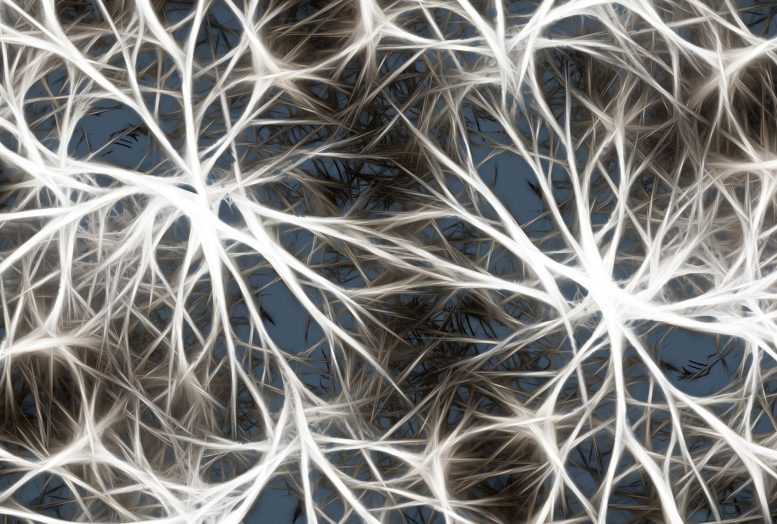
How relapse happens: Opiates reduce the brain’s ability to form, maintain synapses. Preclinical research was focused on revealing the molecular mechanisms behind addiction and relapse.
Exposure to heroin sharply reduces levels of the protein necessary for developing and maintaining the brain’s synapses, a preclinical study by University at Buffalo researchers has found. The development of addiction relapse is directly related to the impact that reductions in this protein, called drebrin, have on specific cells involved in the brain’s pleasure-seeking/reward pathways.
The UB research paper, one of the first to trace the pathophysiology of addiction relapse, was published online on September 12, 2019, in Nature Communications.
The neurobiology of relapse
“Very few research studies have examined the molecular mechanisms of heroin relapse and there is almost nothing published about the specific cell types that these changes occur in,” said David Dietz, PhD, senior author on the paper, chair of the Department of Pharmacology and Toxicology in the Jacobs School of Medicine and Biomedical Sciences at UB and a faculty member in UB’s neuroscience program.
“These findings lead us to a better understanding of the neurobiology of relapse to opiates. In combination with other findings, the research will hopefully provide avenues toward treatments that can prevent relapse behaviors.”
Most currently available treatments are replacement therapies, none of which address the fundamental changes that occur in addiction and lead to relapse, which remains an intractable issue.
Dietz and his colleagues have focused much of their research on relapse after opiate addiction and withdrawal and the structural plasticity in the brain that they cause. He was recently awarded more than $2 million from the National Institutes of Health (NIH) to continue research on drebrin and other potential targets for treating drug addiction.
Drebrin was of interest because the loss of the protein has been previously implicated in brain diseases, such as Alzheimer’s disease and Down syndrome.
“Since drebrin is responsible for developing and maintaining synapses, we wondered if it was also involved in addiction to drugs of abuse, ultimately leading to relapse,” said Dietz.
In experiments with rodents, the UB team determined that exposure to heroin and morphine reduced drebrin levels in the nucleus accumbens, a key part of the brain’s reward pathway.
Synaptic rewiring
The researchers found that opiate exposure causes synaptic rewiring in this part of the brain, as well as a decrease in dendritic spines, the protrusions on neurons that play key roles in neuronal transmission, learning, and memory.
“Opiates fundamentally change how the brain communicates with itself,” Dietz said.
The researchers found that the reduction in drebrin levels is regulated by changes in how an enzyme called HDAC2 facilitates access to the DNA. In addition, the study demonstrates that these changes occur exclusively in a specific type of cell within the nucleus accumbens, known as D1, which contains medium spiny neurons, the type of cells that make up this part of the reward center.
“Restoring drebrin back to normal levels in these specific brain cells was sufficient to reduce relapse behaviors,” said Dietz.
The research provides a critical and understudied insight into the mechanisms behind addiction and relapse behaviors, which in combination with future studies may lead to a novel and effective treatment to prevent relapse.
“Our lab is focused on improving our understanding of the neurobiology of addiction and relapse so that we can figure out the best way to target these pathways for future therapeutic use,” Dietz said.
###
In addition to Dietz, UB co-authors are Jennifer A. Martin; Craig T. Werner; Swarup Mitra; Zi-Jun Wang; Pedro H. Gobira; Andrew F. Stewart; Jay Zhang; Kyra Erias; Justin N. Siemian; Lauren. E. Mueller; Jun-Xu Li; and Karen C. Dietz of the Department of Pharmacology and Toxicology and Ping Zhong and Zhen Yan of the Department of Physiology and Biophysics.
Devin Hagerty and Amy M. Gancarz of California State University, Bakersfield; Rachel L. Neve of Massachusetts General Hospital; Mary Kay Lobo and Ramesh Chandra of the University of Maryland School of Medicine are also co-authors.
The work was funded by the National Institute on Drug Abuse of the NIH.
Reference: “A novel role for the actin-binding protein drebrin in regulating opiate addiction” by Jennifer A. Martin, Craig T. Werner, Swarup Mitra, Ping Zhong, Zi-Jun Wang, Pedro H. Gobira, Andrew. F. Stewart, Jay Zhang, Kyra Erias, Justin N. Siemian, Devin Hagarty, Lauren E. Mueller, Rachael L. Neve, Jun-Xu Li, Ramesh Chandra, Karen C. Dietz, Mary Kay Lobo, Amy M. Gancarz, Zhen Yan and David M. Dietz, 12 September 2019, Nature Communications.
DOI: 10.1038/s41467-019-12122-8